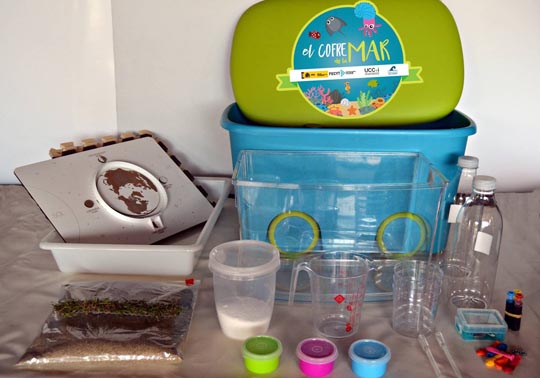The scientific dissemination project “El Cofre de la Mar” for elementary schools starts up. It addresses the cultural and environmental value of the Mediterranean
- Scientific Culture and Innovation Unit
- March 14th, 2018

The Universitat de València initiated last Tuesday “El Cofre de la Mar”. It is an educational programme for elementary school students. It intends to show them the value of the Mediterranean. It is a free activity made up of 12 experiments. It explains them how the sea works: the sea currents, the waves, the light or the pressure. It also links these features with biodiversity, pollution or climate change.
An experiment with ice and hot water to simulate a sea current, a webcam and a USB that contains different web applications to simulate the light and colours that exist beneath the surface of the sea, an experiment that allows you to understand the bioluminescence by means of a couple of squids with lit-up organs, or observing the effects of climate change through a simulation in which the effects of marine acidification can be appreciated. These are some of the proposals of Cofre. They are linked one another thanks to the story “the pirate and her friend the argonaut octopus”. The protagonists of the tale send a letter to the teacher who will carry out the educational activity with the aid of a map. The letter encourages the children to understand and take care of the sea. It also asks them to search the coffin in the map, open it and discover its secrets.
The project was first sent to the schools last Tuesday. The registration period to receive a copy of Cofre de la Mar was opened the same day. The proposal consist in a box that contains the necessary objects to undertake twelve experiments regarding density, pressure, sea currents, waves, light and colours, the species, the Mediterranean ecosystem, bioacoustics, bioluminescence, pollution and climate change. It is made up by 25 components. Among them, a tank of water, a USB, two lit-up squids, a webcam, a teaching guide, food colouring, marine animal cards, pipettes, a tale and a mock-up of tides.
“This is a proposal that that will bring the sea closer to the students. It intends to explain science to them from a practical and dynamic approach. They create experiences so that students interact and understand the theoretical concepts” explained Pau Fortea, Noèlia Sosa y Uxue Urkia. They work for IDEMAR Belharra Assotiation, which is the entity that has worked on this project. “We aim to educate them by means of the scientific knowledge. This way, we pique their curiosity for the marine environment and encourage them to respect our oceans.
The project intends to promote a better knowledge of the cultural and environmental values of the sea. It has been organized by the Scientific Culture Unit of the Universitat de València with the collaboration of the Valencian Department of Education via the CEFIRE in Torrent and Las Naves de Valencia. The project counts with the support of the Spanish Foundation for Science and Technology (FECyT) and the Ministry of Economics, Industry and Competitiveness.
El Cofre de la Mar includes a gaming application that uses a webcam. It allows you to observe images as they are seen at the surface and at the bottom of the sea. In this way, you will be able to notice the loss of colour as the depth increases. There is also a contest for primary school students. They can participate if they record and submit a video. There is a final exhibition, too.
Training session
The proposal encompasses 150 coffins. There will be a teaching session for those teachers who are going to carry out the educational activity. It will take place on Monday 26 of March at Las Naves de Valencia at 4 p.m. 25 coffins will be distributed to 25 schools.
IDEMAR Belharra
The association IDEMAR Belharra is dedicated to marine research, dissemination and education. It is made up of a group of young people educated in Biology, Oceanography, seamanship and scuba diving. They research the Mediterranean and disseminate their conclusions to the society. This way they create a link among them and the sea, and teach them to respect the environment. The association owns the vessel Belharra, a 14 metres long sailing boat.
You can register yourself in the activity in the following link: http://ir.uv.es/3uJpm3G
















